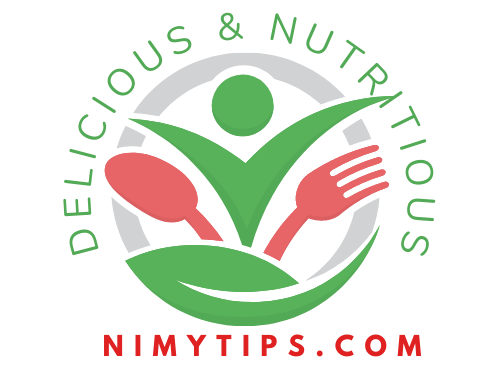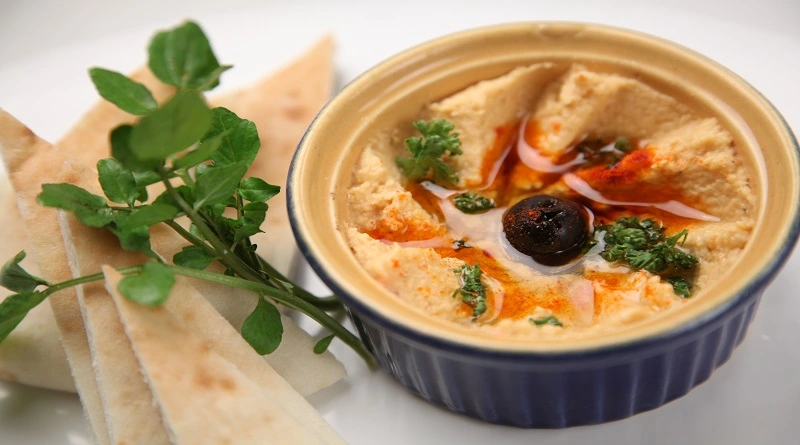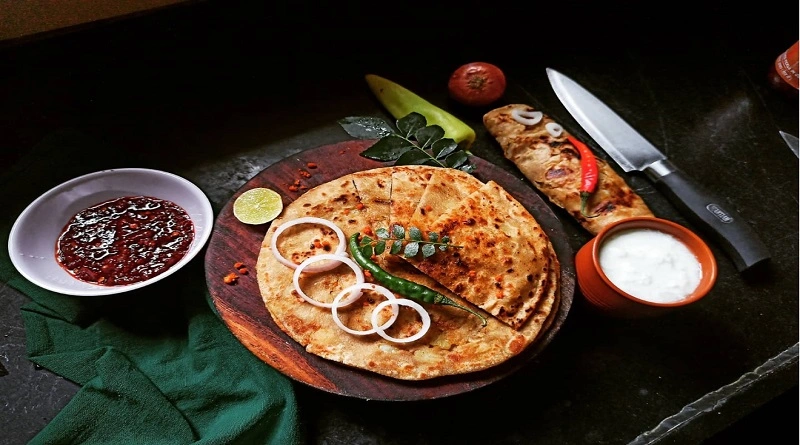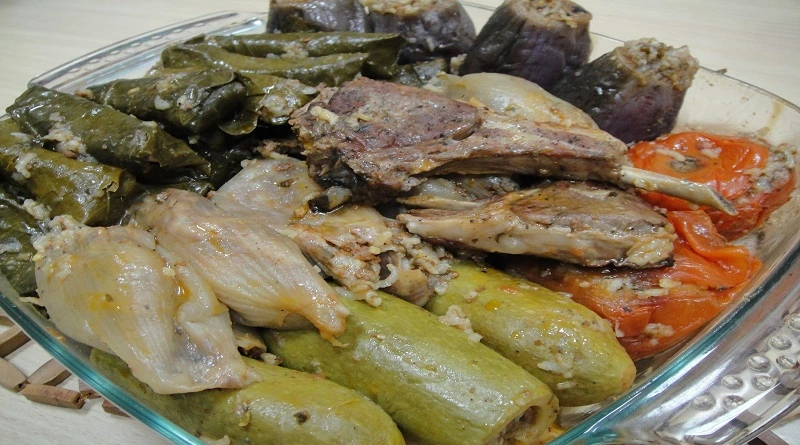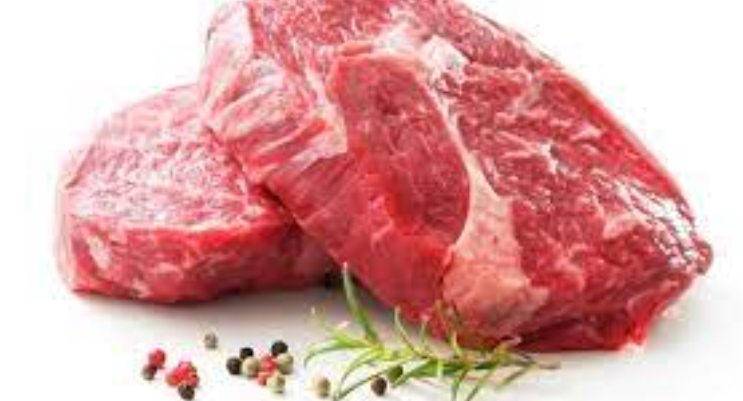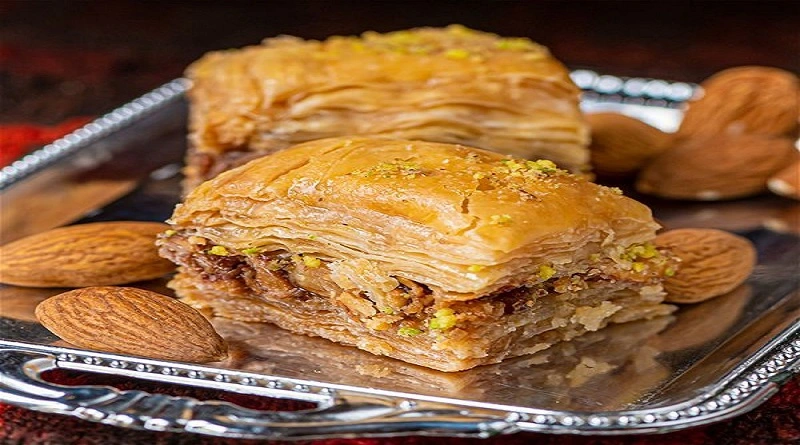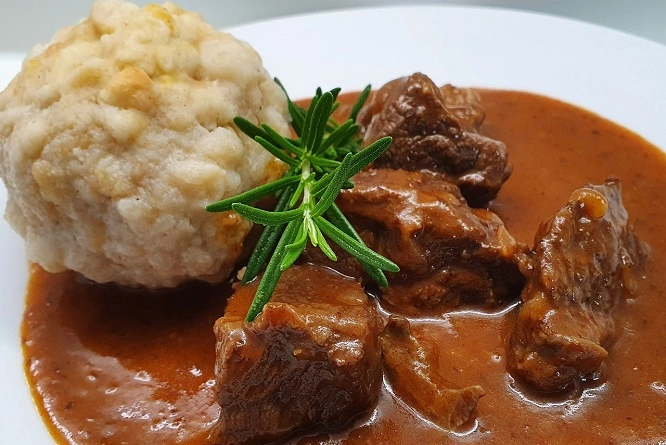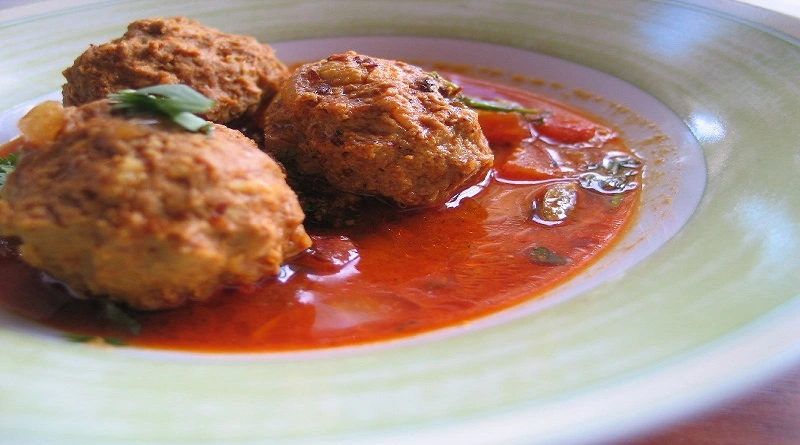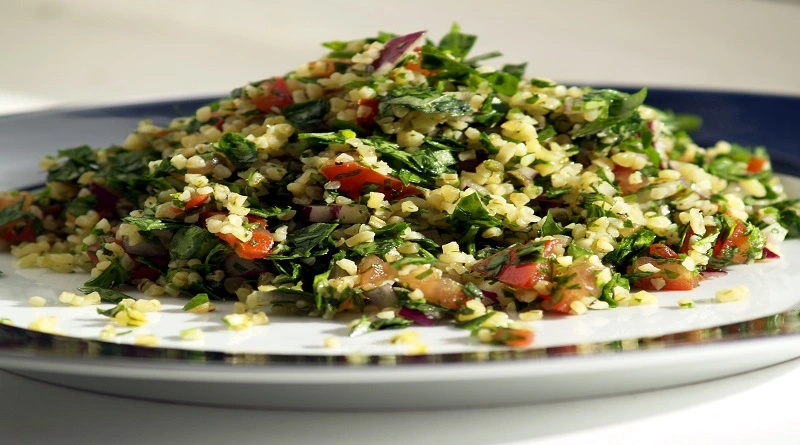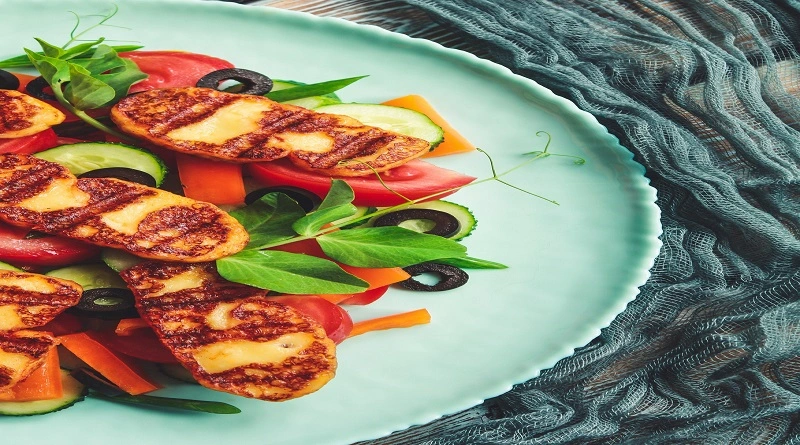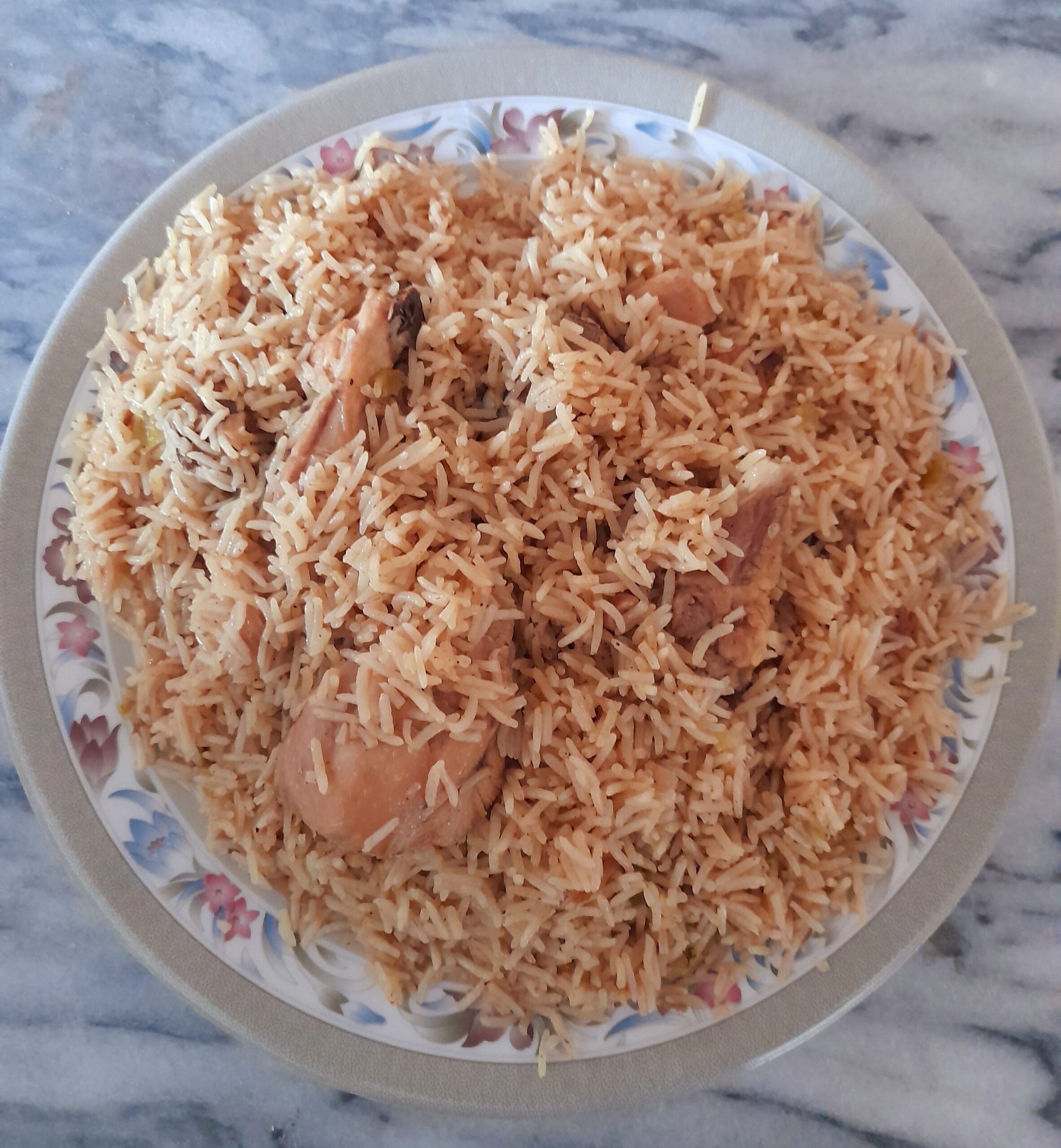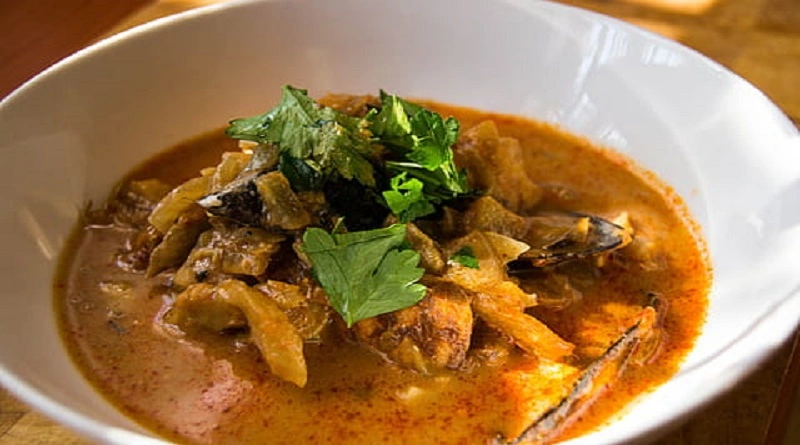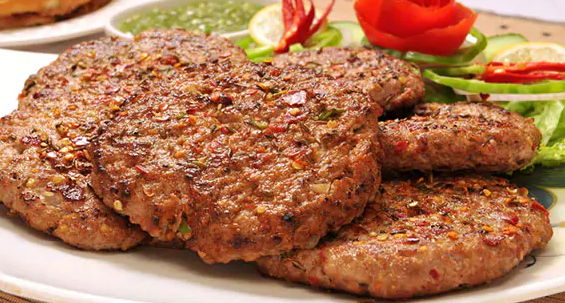Grilled halloumi is a type of cheese that originated in Cyprus and is widely consumed throughout the Middle East, North Africa, and the Mediterranean regions. The cheese is made from a combination of goat’s and sheep’s milk, although cow’s milk may also be used.
Halloumi cheese is a semi-hard cheese that originated in Cyprus, a small island country in the eastern Mediterranean. Cheese has been produced on the island for centuries and is an important part of the country’s cultural heritage. The cheese is made from a mixture of sheep and goat milk and is known for its distinctive salty flavor and rubbery texture.
Introduction
Grilled halloumi is a popular dish that has become increasingly popular in recent years, both in Cyprus and around the world. The dish involves grilling slices of halloumi cheese until they are crispy and golden brown. Grilled halloumi is often served as an appetizer or as part of a mezze platter, and is typically accompanied by a variety of vegetables, dips, and sauces.
The cultural significance of grilled halloumi can be traced back to its origins in Cyprus. The island has a long and rich history and has been inhabited by a variety of cultures over the centuries. The production of halloumi cheese is thought to have been introduced to Cyprus by the Byzantine Empire, and has been a staple of the island’s cuisine ever since.
In addition to its cultural significance, grilled halloumi is also an important part of the island’s economy. Halloumi cheese is a major export for Cyprus and is highly prized around the world for its unique flavor and texture. The popularity of grilled halloumi has helped to increase demand for cheese and has provided a boost to the country’s agricultural sector.
Overall, grilled halloumi is a dish with deep cultural roots and rich history. It is a testament to the resilience and adaptability of Cyprus’s people and is an important part of the island’s culinary heritage. As the popularity of grilled halloumi continues to grow around the world, it serves as a reminder of the power of food to bring people together and connect us to our shared cultural heritage.
This dish is among the most ever-liked dishes in the middle east like Baklava, Knafeh, Iraqi Masgou, Kebab Karz, Mansaf, Shanklish, Shawarma, Falafel, Moutabal, etc.
Introduction
Grilled halloumi is a delicious and nutritious cheese that is gaining popularity around the world. It is a traditional cheese from Cyprus, made from sheep and goat milk, and has a unique texture that makes it perfect for grilling. This article will discuss the health benefits of grilled halloumi and provide a delicious recipe for you to try.
Health Benefits of Grilled Halloumi
- High in Protein
Grilled halloumi is a great source of protein, which is essential for building and repairing tissues in the body. One serving of grilled halloumi (100g) contains around 22g of protein, making it a great option for vegetarians and meat-eaters alike.
- Rich in Calcium
Calcium is important for maintaining strong bones and teeth, and grilled halloumi is an excellent source of this mineral. One serving of grilled halloumi contains around 600mg of calcium, which is almost half of the recommended daily intake for adults.
- Low in Carbohydrates
Grilled halloumi is naturally low in carbohydrates, which makes it a great option for people following a low-carb or ketogenic diet. One serving of grilled halloumi contains only around 2g of carbohydrates, making it a great option for people looking to reduce their carb intake.
- Source of Healthy Fats
Grilled halloumi is also a good source of healthy fats, which are important for maintaining healthy cholesterol levels and brain function. One serving of grilled halloumi contains around 18g of fat, most of which is unsaturated.
Recipe for Grilled Halloumi
Now that you know the health benefits of grilled halloumi, let’s get to the recipe. This recipe is for grilled halloumi skewers for two served with a spicy tomato sauce.
Ingredients:
- 250g halloumi cheese, cut into cubes
- 1 red pepper, cut into chunks
- 1 yellow pepper, cut into chunks
- 1 red onion, cut into chunks
- 1 tbsp olive oil
- Salt and pepper, to taste
- Wooden skewers
For the Spicy Tomato Sauce:
- 1 tbsp olive oil
- 1 onion, finely chopped
- 2 garlic cloves, finely chopped
- 1 tsp paprika
- 1 tsp cumin
- 400g tin of chopped tomatoes
- Salt and pepper, to taste
Utensils required in cocking grilled halloumi
To cook grilled halloumi, you will need several utensils. Here are some of the common utensils required for making grilled halloumi:
- Grill pan or outdoor grill: You will need a grill pan or outdoor grill to cook the halloumi. If you are using a grill pan, make sure it is heated to medium-high heat before adding the halloumi.
- Tongs: You will need tongs to flip the halloumi while it’s cooking. This will prevent the cheese from sticking to the grill and ensure that it’s cooked evenly.
- Knife: You may need a knife to slice the halloumi into desired thickness before cooking.
- Brush or oil sprayer: You can use a brush or oil sprayer to lightly coat the halloumi with olive oil or vegetable oil before grilling. This will prevent the cheese from sticking to the grill and add some flavor.
- Serving dish: You will need a serving dish to transfer the grilled halloumi onto for serving.
Directions:
- Preheat your grill to medium-high heat.
- Thread the halloumi, peppers, and onion onto the wooden skewers.
- Brush the skewers with olive oil and season with salt and pepper.
- Grill the skewers for 5-7 minutes on each side, until the halloumi is golden brown and the vegetables are charred.
- While the skewers are grilling, make the spicy tomato sauce.
- Heat the olive oil in a saucepan over medium heat.
- Add the onion and garlic and sauté for 2-3 minutes, until softened.
- Add the paprika and cumin and cook for 1 minute, until fragrant.
- Add the chopped tomatoes and season with salt and pepper.
- Simmer the sauce for 10-15 minutes, until thickened.
- Serve the grilled halloumi skewers with spicy tomato sauce on the side.
Precautions in cooking
When cooking grilled halloumi, it is important to take certain precautions to ensure that it is safe to eat and that it retains its flavor and texture. Here are some tips to keep in mind when cooking grilled halloumi:
- Use a non-stick pan or grill: Halloumi has a tendency to stick to surfaces, so it is important to use a non-stick pan or grill to prevent it from sticking.
- Do not add oil to the pan: Halloumi releases its own oils when it is heated, so there is no need to add extra oil to the pan. Adding oil can cause the cheese to become greasy and lose its texture.
- Cook on high heat: Halloumi should be cooked on high heat to give it a crispy exterior and a soft, creamy interior. Be careful not to overcook it, as it can become tough and rubbery.
- Do not leave it unattended: Grilled halloumi cooks quickly, so it is important to keep an eye on it while it is cooking to ensure that it does not burn.
- Serve immediately: Grilled halloumi is best when it is served immediately after cooking. If you need to keep it warm, wrap it in foil or place it in a warming drawer.
By following these precautions, you can ensure that your grilled halloumi is safe to eat and delicious.
Side effects of Grilled halloumi
Grilled halloumi is a popular cheese dish that is enjoyed around the world. While it is a delicious and satisfying meal, there are some potential side effects associated with consuming this dish. In this article, we will explore the common side effects of grilled halloumi and provide suggestions on how to mitigate them.
- One of the most common side effects of consuming grilled halloumi is its high salt content. Halloumi cheese is traditionally made with high amounts of salt, and grilling it can further increase the sodium content. Excessive salt consumption can lead to high blood pressure, which is a risk factor for heart disease and stroke. To mitigate this side effect, you can limit your consumption of grilled halloumi or choose lower-salt options.
- Another potential side effect of grilled halloumi is its high-fat content. Halloumi is a cheese that is high in saturated fats, which can increase your cholesterol levels and increase your risk of heart disease. To mitigate this side effect, you can limit your intake of grilled halloumi or choose lower-fat options.
- Additionally, some people may experience digestive issues such as bloating, gas, or stomach discomfort after consuming grilled halloumi. This may be due to lactose intolerance, as halloumi cheese is a dairy product. To mitigate this side effect, you can limit your consumption of this dish or choose lactose-free options.
In conclusion, grilled halloumi is a delicious cheese dish that can be enjoyed in moderation. However, it is important to be aware of the potential side effects associated with its consumption, such as high salt and fat content and digestive issues. By limiting your consumption or choosing lower-salt, lower-fat, or lactose-free options, you can mitigate these side effects and continue to enjoy this tasty meal.
Conclusion
Grilled halloumi is a delicious and nutritious cheese that is packed with protein, calcium, and healthy fats, and is low in carbohydrates. It is easy to grill and can be enjoyed in various dishes. The recipe provided in this article is a great way to enjoy this dish, and the spicy tomato sauce adds an extra layer of flavor. Whether you’re looking for a healthy snack or a tasty addition to your next barbecue, it is a great choice.
FAQs
Is grilled halloumi a healthy cheese?
Yes, it is a healthy cheese that is high in protein, calcium, and healthy fats. It is also low in carbohydrates, which makes it a great option for people following a low-carb or ketogenic diet.
How do you store leftover grilled halloumi?
The leftover dish should be stored in an airtight container in the refrigerator. It will keep for up to 3 days.
Can you freeze grilled halloumi?
Yes, you can freeze it. It is best to freeze it in an airtight container or freezer bag. When you’re ready to eat it, thaw it in the refrigerator overnight and then reheat it in the oven or on the grill.
What other dishes can you make with grilled halloumi?
It can be used in various dishes, such as salads, sandwiches, and wraps. You can also serve it as a side dish with grilled vegetables or use it as a topping for pizzas.
Is it safe to eat grilled halloumi if you’re lactose intolerant?
It is a low-lactose cheese, which means that it is generally safe for people with lactose intolerance to eat in moderation. However, if you have severe lactose intolerance, you should talk to your doctor before adding this dish to your diet.
References
- “The Arabian Nights Cookbook: From Lamb Kebabs to Baba Ghanouj, Delicious Homestyle Arabian Cooking” by Habeeb Salloum.
- “Arabian Delights: Recipes & Princely Entertaining Ideas from the Arabian Peninsula” by Amy Riolo.
- “The Complete Middle Eastern Cookbook” by Tess Mallos.
- “Classic Lebanese Cuisine: 170 Fresh and Healthy Mediterranean Favorites” by Kamal Al-Faqih.
- “The Food of Oman: Recipes and Stories from the Gateway to Arabia” by Felicia Campbell.
- “The Lebanese Kitchen: Quick and Healthy Recipes” by Monique Bassila Zaarour.
- “Persiana: Recipes from the Middle East & Beyond” by Sabrina Ghayour.
- “The Jewelled Kitchen: A Stunning Collection of Lebanese, Moroccan and Persian Recipes” by Bethany Kehdy.
- “Saha: A Chef’s Journey Through Lebanon and Syria” by Greg Malouf.
- “The New Middle Eastern Vegetarian: Modern Recipes from Veggiestan” by Sally Butcher.
- https://en.wikipedia.org/wiki/Halloumi
